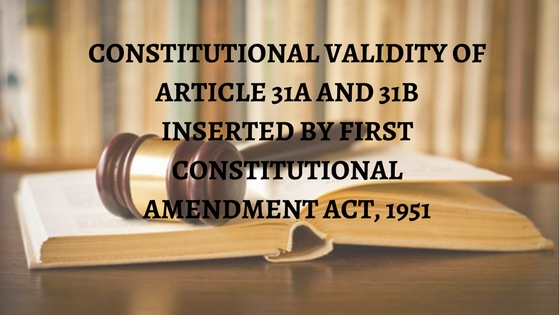Aapka Consultant Judgment Series- In this series, we are providing case analysis of Landmark Judgments of Hon’ble Supreme Court of India.
Sri Sankari Prasad Singh Deo Vs. Union of India (UOI) and State of Bihar
AIR 1951 SC 458, [1952] 1 SCR 89
Hon’ble Judges/Coram: M. Patanjali Sastri, H.J. Kania, C.J., B.K. Mukherjea, S.K. Das and N. Chandrasekhara Aiyar, JJ.
Date of Decision: 05.10.1951
FACTS: –
The political party now in power, commanding as it does a majority of votes in several State legislatures as well as in Parliament, carried out certain measures of agrarian reform in Bihar, Uttar Pradesh and Madhya Pradesh by enacting legislation which may compendiously be referred to as Zamindary Abolition Act. Certain zemindars, feeling themselves aggrieved, attacked the validity of those Acts in courts of law on the ground that they contravened the fundamental rights conferred on them by Part III of the Constitution. The High Court of Patna held that the Act passed in Bihar was unconstitutional while the High Courts of Allahabad and Nagpur upheld the validity of the corresponding legislation in Uttar Pradesh and Madhya Pradesh respectively. Appeals from those decisions are pending in this Court. Petitions filed in this Court by some other zemindars seeking the determination of the same question are also pending. The Union Government, with a view to put an end to all this litigation brought forward a bill to amend the Constitution, which, after undergoing amendments in various particulars, was passed by the requisite majority as the Constitution (First Amendment) Act, 1951, (hereinafter referred to as the Amendment Act). Thereafter, Zemindars have brought the present petitions under article 32 of the Constitution impugning the Amendment Act itself as unconstitutional and void.
ISSUE: –
Whether the Constitution (First Amendment) Act, 1951, which was passed by the present provisional Parliament and purports to insert, inter alia, articles 31A and 31B in the Constitution of India is ultra vires and unconstitutional?
JUDGMENT: –
The provisional Parliament is competent to exercise the power of amending the Constitution under Art. 368. The fact that the said article refers to the two Houses of the Parliament and the President separately and not to the Parliament, does not lead to the inference that the body which is invested with the power to amend is not the Parliament but a different body consisting of the two Houses. The words “all the powers conferred by the provisions of this Constitution on Parliament” in Art. 379 are not confined to such powers as could be exercised by the provisional Parliament consisting of a single chamber, but are wide enough to include the power to amend the Constitution conferred by Article 368.
The Constitution (Removal of Difficulties) Order No. 2 made by the President on the 26th January, 1950, which purports to adapt Article 368 by omitting “either House of” and “in each House” and substituting “Parliament” for “that House” is not beyond the powers conferred on him by Article 391 and ultra vires. There is nothing in Article 392 to suggest that the President should wait, before adapting a particular article, till the occasion actually arose for the provisional Parliament to exercise the power conferred by the article. The view that Article 368 is a complete code in itself in respect of the procedure provided by it and does not contemplate any amendment of a Bill for amendment of the Constitution after it has been introduced, and that if the Bill is amended during its passage through the House, the amendment Act cannot be said to have been passed in conformity with the procedure prescribed by Art. 368 and would be invalid, is erroneous.
Although “law” must ordinarily include constitutional law there is a clear demarcation between ordinary law which is made in the exercise of legislative power and constitutional law, which is made in the exercise of constituent power. In the context of Article 13, “law” must be taken to mean rules or regulations made in exercise of ordinary legislative power and not amendments to the constitution made in the exercise of constituent power with the result that Article 13(2) does not affect amendments made under Article 368. Articles 31A and 3lB inserted in the Constitution by the Constitution (First Amendment) Act, 1951, do not curtail the powers of the High Court under Article 226 to issue writs for enforcement of any of the rights conferred by Part III or of the Supreme Court under Articles 132 and 136 to entertain appeals from orders issuing or refusing such writs; but they only exclude from the purview of Part III ’certain classes of cases. These articles therefore do not require ratification under clause (b) of the proviso to Article 368.
HELD: –
The Constitution (First Amendment) Act, 1951, which has inserted, inter alia, Articles 31A and 3lB in the Constitution of India is not ultra vires or unconstitutional.
To Get Legal Opinion from Advocates/ Legal Experts, Please click here
To Get Legal Opinion from Retired Hon’ble Judges, Please click here












